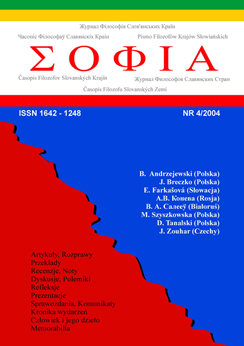
We kindly inform you that, as long as the subject affiliation of our 300.000+ articles is in progress, you might get unsufficient or no results on your third level or second level search. In this case, please broaden your search criteria.




The aim of this essay is to give some indication of the practical, sometimes even pragmatic character of Polish thought, ever since its beginnings in the Middle Ages. However, we will endevour to substantiate that Polish philosophy differs from radical practicality, especially from its pragmatic version. Rejecting, as we are going to show, extreme (most frequently, German) rationalism, it did not accept without reservations the postulates of British-American philosophy either. Resting its hierarchy of values on the practical criterion, Polish philosophy did not get lost in an uncritical way in pragmatic relativism and subjectivism. Since the 19th century it exercised, in a conscious and studied way, its own specific character, whose crowning achievement was "Polish humanism", the marking method of which was that of "theoria cum praxi". The argument will be substantiated using the examples of selected and shortly presented personalities and moments of Polish philosophy, from the Middle Ages to the 2th century.
More...

Introduction to the Polemics about Values of United Europe
More...

Book Review: Sabina Tolnaiová a Slavomír Gálik (ed.), Zbornfk, Človek, kultúra, hodnoty Vydavatel'stvo IRIS, Bratislava 2002
More...
The Round Table of The Philosophers of Slav Countries (30 V 2003)
More...
The text focuses on one specyfic aspeet of contemporary Slovenian and Polish political construction of reality: their religious-national mythologies. Both nations are paleed in "Latin (or Catholie) religio-cultural pattern", therefore some common characteristic can be observed, but on the other side also considerable differenees. In first part of the text some theoretical considerations - like the definition of "Christoslavism" - are presented, and after this the complex background of its historical formation among Slovenes and Poles is discussed. In the second part of the text, this Christoslavic structure and mythological features of Slovenian and Polish religious -national mythologies are analysed: the "immanent Catholicism" of both nations, religious differences with the neighbours, religious-national messianism, mythic interpretation of historic events, demonisation of the adversaries, strong popular devotion to the Roly Virgin; and folk religiosity. In the conclusion, some main similarities as well as differences between the two religious-national mythologies are summarized.
More...
As the basic principle of action, the ethical position of Bolesław Józef Gawecki known as perfectionism recognizes the strive for the ideal of moral perfection. Perfectionism, as an ethical doctrine, remains in harmony with the general character of the philosophy of development. Perfectionism is based on the notions of virtues and their assessment, values, norms, progress, and inner order. The type of being to which as an ideal the man should strive is the synthesis of geniality and sanctity. Man's portliness is based on the consciousness of this ideal.
More...
The Round Table of The Philosophers of Slav Countries (30 V 2003)
More...
Book Review: Zbyszka Melosik, Kryzys męskości w kulturze współczesnej, Wydawnictwo Wolumin, Poznań 2002, ss. 200
More...


The author sketches the main trends in Milosz's historiosophic views. He starts with contrasting Milosz's tendency towards a disinterested contemplation of being with his propensity for the understanding of "doing" and the related need of involvement. Miłosz analyzes the extraordinary "acceleration oj history" in the last two centuries. He alsa tries to grasp the exceptionally complicated and tragic sequence of events in a poorly known part of Europe between Germany and Russia, on the territory of old-time Poland. The analysis of Milosz's views on a widely understood globalization concludes the text.
More...


